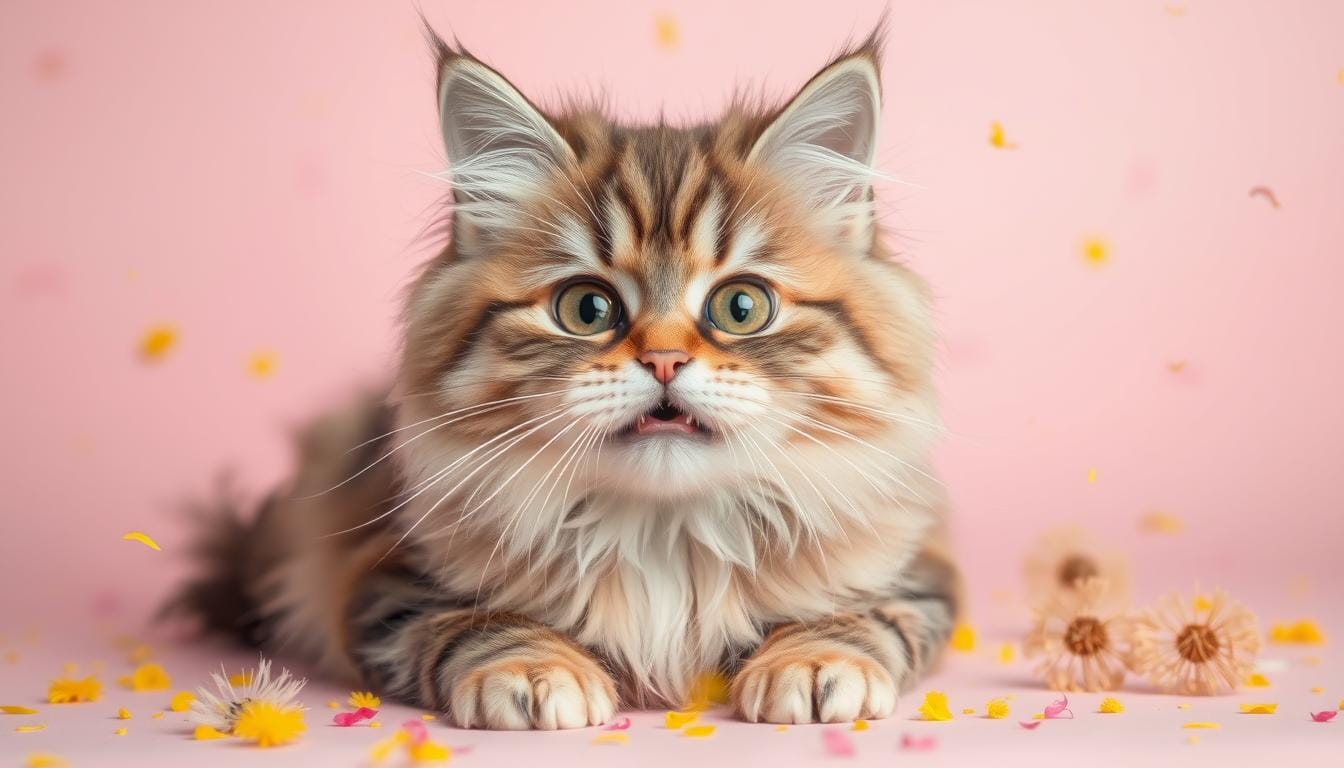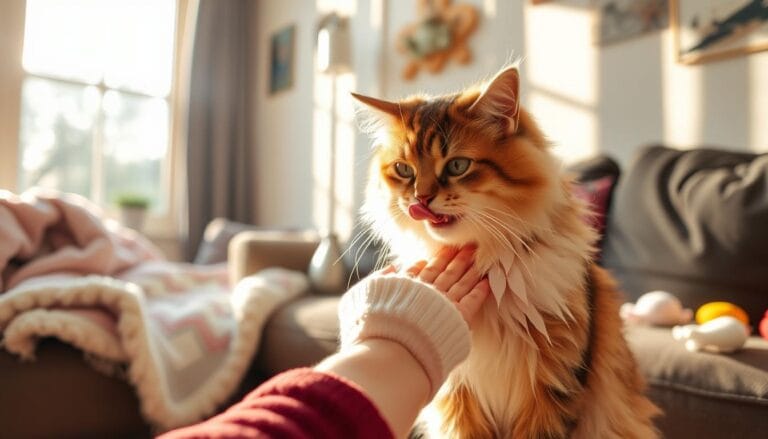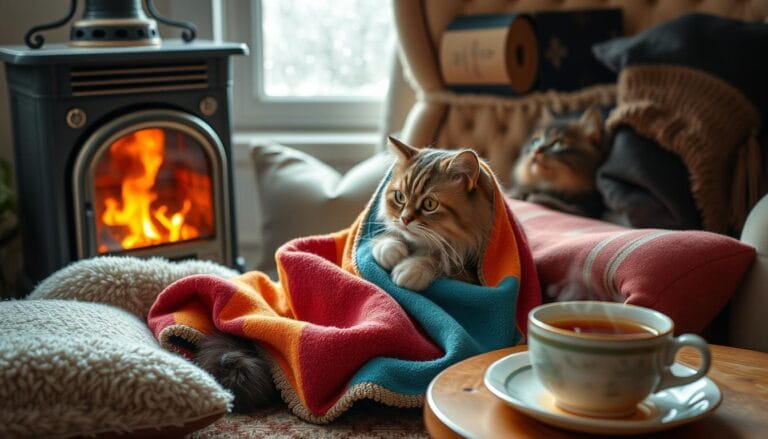Cat Sneezing a Lot? 7 Common Reasons and Fixe
Seeing your cat sneeze a lot can worry you. You might wonder why it’s happening and what to do. Sneezing in cats can be due to many things, from dust to serious diseases like cancer.
Table of Contents
It’s important to know why your cat is sneezing. This helps you give the right care. In this article, we’ll look at common reasons for cat sneezing. We’ll also give you tips to help your cat feel better.
Key Takeaways
- Cat sneezing a lot can be caused by various factors, including upper respiratory infections, allergies, and dental problems.
- Why is my cat sneezing is a common question among cat owners, and understanding the cause is key to proper care.
- Regular vet visits can prevent problems from URIs and keep your cat healthy.
- Sneezing in cats can signal an underlying issue. It’s vital to find the cause for the best treatment.
- Cat sneezing a lot can be treated with methods like nasal lavage, humidifiers, and antibiotics.
- Knowing the common reasons for cat sneezing helps you care for your pet better.
- Exploring the common causes of cat sneezing can answer your question of why it’s happening.
Understanding Why Your Cat Is Sneezing a Lot
If you’ve noticed your cat sneezing a lot, it can be both concerning and perplexing. Cats, like humans, can experience respiratory issues for a variety of reasons. Sneezing is a natural reflex that helps clear irritants from the nasal passages, but when a cat is sneezing a lot frequently, it may signal underlying health problems. Understanding the potential causes of a cat sneezing a lot is essential for ensuring their well-being.
One common reason for a cat sneezing a lot is exposure to allergens, such as pollen, dust, or mold. Just as we suffer from seasonal allergies, cats can react to environmental irritants. If your cat’s sneezing coincides with seasonal changes or new cleaning products, allergens might be the trigger. Environmental shifts, like introducing new furniture or plants, can also cause a cat sneezing a lot.
Another potential cause of a cat sneezing a lot is an upper respiratory infection, often caused by viruses, bacteria, or fungi. These infections may include symptoms like nasal discharge, lethargy, or runny eyes. If your cat is sneezing a lot alongside these signs, prompt veterinary care is crucial to prevent complications.
In severe cases, a cat sneezing a lot could indicate dental issues or nasal tumors. Since tooth roots are near nasal passages, oral problems can mimic respiratory symptoms. Persistent sneezing or behavioral changes warrants an immediate vet visit. Monitoring a cat sneezing a lot and acting quickly ensures your furry friend stays healthy.
Normal vs. Excessive Sneezing
It’s normal for cats to sneeze sometimes. But, if they sneeze a lot or seem upset, it’s time to see the vet. They can find out why your cat is sneezing and tell you how to help.
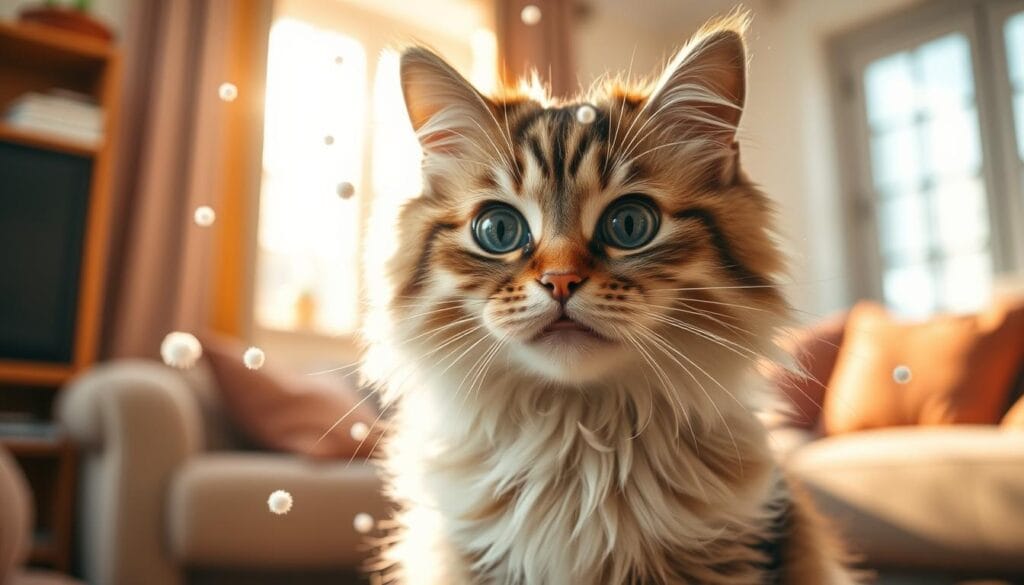
When to Be Concerned About Your Cat’s Sneezing
Some signs mean your cat’s sneezing is serious. Look out for:
- Excessive nasal discharge
- Coughing or wheezing
- Runny eyes or conjunctivitis
- Fatigue or loss of appetite
If you see these signs, get your cat to the vet fast. Knowing why your cat sneezes and acting quickly can help them feel better.
Upper Respiratory Infections: The Most Common Culprit
When your kitty keeps sneezing, it might mean there’s a problem. Upper respiratory infections (URIs) are the top reason for sneezing in cats, making up 90% of cases. These infections can spread fast from cat to cat, caused by viruses or bacteria.
Feline herpes virus (FHV) and feline calicivirus (FCV) are common culprits. Most cats get these viruses as kittens and carry them forever. If your kitty sneezes a lot, it could be a sign of a URI, along with other symptoms like nose or eye discharge.
Treatment for URIs depends on how bad the infection is. For mild cases, treatments like humidifiers, antihistamines, and NSAIDs might help. But for severe cases, your cat might need to stay in the hospital and get IV fluids.
Here are some important points to remember: * FHV and FCV cause 90% of URIs in cats * Most cats carry these viruses their whole lives * If your kitty sneezes a lot over several days, it’s time to see the vet * Look out for other symptoms like yellow, green, or bloody discharge from the nose or eyes
Environmental Triggers Making Your Cat Sneeze
When looking for a cure for your cat’s sneezing, think about environmental triggers. These can be in your home and make your cat sneeze. Strong smells, like chemicals or other odors, can trigger sneezing, says the first source. The second source adds that inhaling irritants or allergens can also make cats sneeze.
To lessen your cat’s sneezing, take a few easy steps. Use natural cleaners and air fresheners to avoid irritating your cat’s nose. Also, an air purifier can help by removing dust and pollen, making breathing easier for your cat.
Common Environmental Triggers
- Household cleaners and air fresheners
- Dust and pollen
- Smoke and strong odors
Knowing what makes your cat sneeze helps you create a sneeze-free space. Remove triggers and use a sneezing cure to ease your cat’s symptoms. Remember, every cat is unique, so you might need to try a few things to find what works best for your cat.
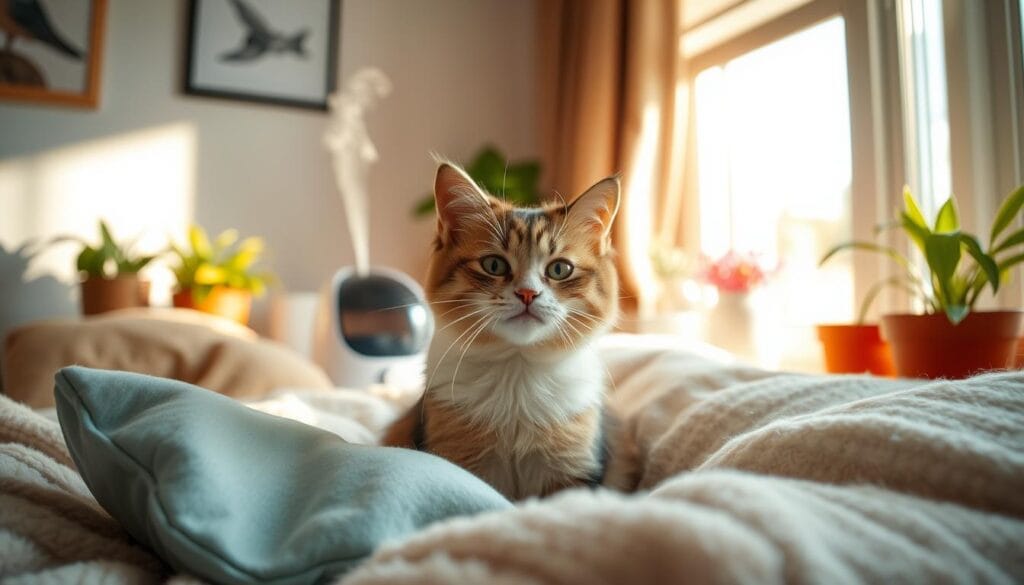
Dental Problems and Their Connection to Sneezing
Wondering why is my cat sneezing? Dental problems could be the reason. Dental disease is common in cats and can cause sneezing. Infections and inflammation from the teeth can affect the nasal passages, making cats sneeze a lot.
Some dental issues that might make cats sneeze include:
- Periodontal disease, caused by plaque, leading to gum inflammation and damage
- Tooth resorption, affecting 30% to 70% of cats
- Gingivitis, causing inflammation and can make cats lose their appetite
Regular dental checks, including anesthesia and dental X-rays, are key. Preventive dental care, like VOHC-approved treats, can lower the risk of dental disease. If your cat sneezes a lot, see your vet to check for dental issues.
Fixing dental problems can stop your cat’s sneezing and prevent worse health issues. Remember, dental disease is common in cats. Keeping their teeth clean is vital for their health.
Foreign Objects: When Something’s Stuck in Your Cat’s Nose
If your cat is sneezing a lot, it might have something stuck in its nose. This is a serious issue that can be dangerous if not treated quickly. A cat sneezing and coughing could mean there’s something blocking its airway.
Signs of this problem include a lot of sneezing, nasal discharge, and your cat pawing at its face. If you think your cat has something stuck in its nose, call your vet right away. They might use CT scans to see if there’s something there.
In some cases, the vet can see and remove the object while your cat is under sedation. But, if it’s more serious, they might need to use special tools to get it out. After removing the object, your cat will need to rest for at least 24 hours to heal well.
Signs of Foreign Body Obstruction
- Excessive sneezing
- Nasal discharge
- Pawing at the face
- Coughing
If you see any of these signs, get your cat to the vet fast. Remember, a cat sneezing a lot can be a sign of a big problem. Quick action is key to avoid worse issues.
Effective Home Remedies for Cat Sneezing
When your kitty keeps sneezing, it worries you and your pet. Some cases need vet help, but home remedies can ease symptoms. They make your cat more comfortable.
Using a humidifier is a good remedy. It adds moisture to the air, soothing your cat’s nose. Saline nasal drops can also help by loosening mucus.
There are more ways to help your cat. Keep their space clean and free of dust. Make sure they drink plenty of water and eat well. A calm environment, like soothing music, can also help.
- Keeping your cat’s environment clean and free of dust and other allergens
- Providing your cat with plenty of fresh water and a balanced diet
- Creating a soothing environment for your cat, such as by playing calming music or using a pheromone diffuser
Watch your cat’s sneezing closely. See a vet if it doesn’t stop or if your cat has other symptoms. A holistic approach to your cat’s health can reduce sneezing. This keeps them happy and healthy.
Every cat is unique, and what works for one might not for another. Work with your vet to find the best remedy for your cat. This way, your kitty can feel their best.
When to Take Your Sneezing Cat to the Vet
If your cat is sneezing a lot, finding the cause is key to their care. Some sneezing can be handled at home, but sometimes, a vet visit is needed. You might wonder why your cat is sneezing, and it could be due to infections or environmental factors.
It’s important to know why your cat is sneezing. If they sneeze a lot, have nasal discharge, or show other signs, see a vet. The vet will check them thoroughly and might take samples to check for infections.
Some signs mean you should take your cat to the vet right away. These include:
- Thick, yellow, or green nasal discharge
- Coughing or wheezing
- Difficulty breathing
- Poor appetite or weight loss
These symptoms could mean a serious issue like an upper respiratory infection. Taking your cat to the vet ensures they get the right care. You’ll also find out why they’re sneezing.
Preventing Future Sneezing Episodes
To stop your cat from sneezing a lot, take action early. Regular vet visits can spot health problems early. About 10-20% of cats have allergies, causing sneezes and more. Keeping your cat’s health in check and their space clean can lower risks.
Here are some ways to stop sneezing:
- Feed your cat a balanced diet for better health
- Keep their living space clean, including litter boxes
- Use a humidifier to fight dry air that irritates their nose
These steps can help cut down on sneezing and coughing. If your cat sneezes a lot, see a vet to check for health issues. With the right care, your cat can stay healthy and sneeze less.
Knowing about seasonal allergies and upper respiratory infections helps too. Work with your vet to keep your cat healthy and sneeze-free.
Conclusion: Keeping Your Cat Healthy and Sneeze-Free
Understanding why your cat sneezes is important for their health. Addressing allergies, infections, or dental issues can help. Regular vet visits and good care are key to keeping your cat healthy.
With the right care, your cat can breathe easily and live happily. Stay alert, keep their environment clean, and seek vet advice when needed. This way, your cat will stay playful and sneeze-free. Your cat’s health is important, so take action to keep them well.
FAQ
What are the common reasons why my cat is sneezing a lot?
Cats sneeze for many reasons. Upper respiratory infections are common. Household cleaners and dust can also trigger sneezing. Dental problems and foreign objects in the nose are other causes.
How can I tell if my cat’s sneezing is normal or excessive?
Normal sneezing in cats is rare and doesn’t come with other symptoms. But, if your cat sneezes a lot and shows other signs like coughing or runny eyes, it might be a health issue.
What are the symptoms of an upper respiratory infection in cats?
Cats with upper respiratory infections sneeze, cough, and have nasal discharge. They might also have eye discharge, fever, and lose their appetite. These infections spread easily and often need vet treatment.
What environmental triggers can make my cat sneeze?
Household cleaners, air fresheners, and dust can make cats sneeze. So can smoke and strong smells. Reducing your cat’s exposure to these can help.
Can dental problems cause my cat to sneeze?
Yes, dental issues like gum disease can cause sneezing in cats. Fixing these problems can help stop the sneezing.
What should I do if I think my cat has a foreign object stuck in their nose?
If you think your cat has something stuck in their nose, take them to the vet right away. Don’t try to remove it yourself. Your vet can safely take it out.
What home remedies can help with my cat’s sneezing?
Using a humidifier and saline nasal drops can help. Creating a calm environment is also good. But, always check with your vet before trying these.
When should I take my cat to the vet for sneezing?
Take your cat to the vet if they sneeze a lot and show other symptoms like trouble breathing. If they seem very sick or in distress, go right away.
How can I prevent future sneezing episodes in my cat?
Keep your cat’s area clean and feed them well. Regular vet visits are key. Watching your cat’s health closely can help avoid sneezing problems.
There are no reviews yet. Be the first one to write one.

